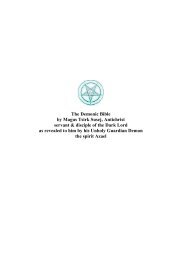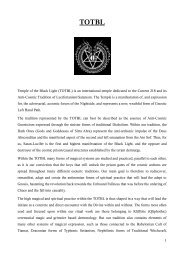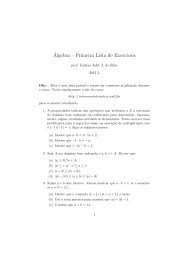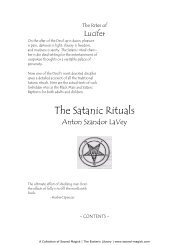Satanism Today - An Encyclopedia of Religion, Folklore and Popular ...
Satanism Today - An Encyclopedia of Religion, Folklore and Popular ...
Satanism Today - An Encyclopedia of Religion, Folklore and Popular ...
Create successful ePaper yourself
Turn your PDF publications into a flip-book with our unique Google optimized e-Paper software.
Islam 129<br />
sort <strong>of</strong> interworld (barzakh), a realm located<br />
closer to the luminous cosmic center, until the day<br />
<strong>of</strong> resurrection. In this interworld, which somewhat<br />
resembles dreaming, the soul <strong>of</strong> the<br />
deceased, liberated from its bodily layers, can<br />
awaken <strong>and</strong> become aware <strong>of</strong> its true nature. The<br />
interworld period is important in preparing for<br />
the day <strong>of</strong> resurrection, which occurs at the end <strong>of</strong><br />
time—when human possibilities <strong>and</strong> potential<br />
have been exhausted. The day <strong>of</strong> resurrection<br />
(referred to as qiyama, the return, or ba’th, awakening),<br />
which constitutes one <strong>of</strong> the essential<br />
beliefs <strong>of</strong> the Islamic faith, is believed by some to<br />
last thous<strong>and</strong>s <strong>of</strong> years. On this day the souls,<br />
rejoined with their bodies, will be assigned eternal<br />
life either in paradise (literally the Garden) or in<br />
hell (the fire), depending on their merits.<br />
Although the figure <strong>of</strong> the Madhi is more<br />
central to Shiite Islam, it is a popular belief among<br />
many Sunni Muslims that a righteous leader (a<br />
Madhi or “rightly guided one”) will reign for a<br />
brief period in the last days. He will be followed by<br />
an imposter messiah (parallel to the Christian<br />
notion <strong>of</strong> an <strong>An</strong>tichrist) who will attempt to lead<br />
the world astray. Finally, however, the prophet<br />
Jesus will appear to usher in the final judgment.<br />
On Judgment Day the earth will quake <strong>and</strong> mountains<br />
become a “heap <strong>of</strong> s<strong>and</strong>”: “When the stars<br />
shall be extinguished, when heaven shall be split,<br />
when the mountains shall be scattered.” (Arberry<br />
1969, 318). As in the judgment day scenarios <strong>of</strong><br />
other Middle Eastern religions, the dead are resurrected:<br />
“Upon the day when the Caller shall call<br />
unto a horrible thing, abasing their eyes, they shall<br />
come forth from the tombs as if they were scattered<br />
grasshoppers, running with outstretched<br />
necks to the Caller. The unbelievers shall say, ‘This<br />
is a hard day!’” (Arberry 1969, 247). <strong>An</strong>d judged:<br />
“Then he whose deeds weigh heavy in the Balance<br />
shall inherit a pleasing life, but he whose deeds<br />
weight light in the Balance shall plunge in the<br />
womb <strong>of</strong> the Pit” (Arberry 1969, 348).<br />
Paradise (al-Jannah) is located at the macrocosmic<br />
center <strong>of</strong> light <strong>and</strong> is composed <strong>of</strong> eight<br />
levels (or, according to some authorities, as many<br />
as the number <strong>of</strong> souls). This is viewed as a garden<br />
where all kinds <strong>of</strong> delights are prepared for the<br />
saved. On the far outer part <strong>of</strong> the macrocosm lies<br />
Arabic amulet with an Koranic inscription (Fortean<br />
Picture Library)<br />
hell (an-nar), arranged in seven layers, where the<br />
soul’s punishment consists <strong>of</strong> being far from God,<br />
which is considered to be the worst chastisement.<br />
More so than Judeo-Christian scriptures, the<br />
Koran contains a number <strong>of</strong> vivid descriptions <strong>of</strong><br />
both paradise <strong>and</strong> hell. For instance, in the chapter<br />
entitled “The Terror,” the Koran says, “They are<br />
brought nigh the Throne, in the Gardens <strong>of</strong><br />
Delight upon close-wrought couches reclining<br />
upon them, set face to face, immortal youths going<br />
round about them with goblets, <strong>and</strong> ewers, <strong>and</strong> a<br />
cup from a spring <strong>and</strong> such fruits as they shall<br />
choose, <strong>and</strong> such flesh <strong>of</strong> fowl as they desire,<br />
<strong>and</strong> wide-eyed houris as the likeness <strong>of</strong> hidden<br />
pearls, a recompense for that they labored”<br />
(Arberry1969, 254). Equally vivid descriptions <strong>of</strong><br />
Hell can be found throughout the Koran, as in the<br />
chapter “The Pilgrimage”: “garments <strong>of</strong> fire shall<br />
be cut, <strong>and</strong> there shall be poured over their heads<br />
boiling water whereby whatsoever is in their<br />
bellies <strong>and</strong> their skins shall be melted; for them<br />
await hooked iron rods; as <strong>of</strong>ten as they desire in<br />
their anguish to come forth from it, they shall be
















